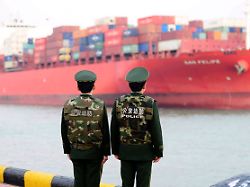What is “de-risking”?
How Germany wants to get its China risk under control
By Max Borowski
06/20/2023, 8:11 p.m
China is Germany’s most important, but at the same time a difficult trading partner: The communist government commits serious human rights violations, for example against the Uyghur minority and opposition figures in Hong Kong. It is militarily threatening Taiwan and other countries in the region. The trade restrictions in the course of the corona pandemic in China have already had a noticeable impact on Germany. Possible sanctions in the event of a war over Taiwan would be an incalculable risk for Germany. In addition, there is the justified suspicion that China wants to gain access to Germany’s critical infrastructure, for example through secret back doors in products from Chinese manufacturers such as Huawei and through targeted investments in the port of Hamburg, for example.
On the one hand, the EU Commission and, after much hesitation, the German government have recognized the dangers of this problematic relationship, but on the other hand they do not want to endanger trade, which is profitable for both sides, but want to expand it as far as possible. “De-risking” without “decoupling” the economy are the keywords used by Commission President Ursula von der Leyen and Federal Chancellor Olaf Scholz to describe their strategy. What is behind these terms? And how can this be implemented in concrete terms? The most important answers:
“decoupling”
“Decoupling” means decoupling. A far-reaching severing of economic relations with China would end the dependency of Germany and Europe, but the price for this would be extreme. Germany imported goods and services worth 192 billion euros from China last year. Obtaining these products from other suppliers would be significantly more expensive in many cases and impossible in some cases. German industry would lack important preliminary products and raw materials, some of which China has a monopoly on. At the same time, with sales of 107 billion euros in 2022, China is an important market for German exports. Germany and China are also closely linked through investments: more than 5000 German companies are active in China. Despite political tensions, concerns about intellectual property and complaints about discriminatory rules, German corporations are currently expanding their presence with billions in new investments. This makes it clear that many German companies have no intention of even partially withdrawing from China.
“de risking”
The federal government is also in favor of German-Chinese trade relations continuing to grow. However, at the same time, dangerous dependencies are to be broken down in a targeted manner and the risk reduced. This is what the English term “de-risking” stands for. The idea: Large trading volumes do not mean large dependencies. Some imported goods from China would simply be dispensable in the event of a conflict, for others there are enough alternative suppliers. In the case of important products that are highly dependent, the risk should be analyzed and, if necessary, precautions taken for delivery failures by looking for additional suppliers or building up reserves. For EU Commission President von der Leyen, “de-risking” also includes investments in alternative locations. In addition, she wants to pay special attention to arms exports.
Where exactly is Germany’s dependency on China?
It is known that China has a monopoly on some rare earths and other important raw materials. Some basic chemicals, including products for the pharmaceutical industry, are also manufactured almost exclusively in China. Chinese manufacturers also have a high market share for electronic items such as notebooks, tablets and smartphones. While rare earths from China can hardly be replaced, with other products it is sometimes not clear whether they can also be procured from other countries or made in Germany – and at what cost. The economist calls for the first step towards effective “de-risking”. Jurgen Matthes a correspondingly comprehensive analysis was therefore carried out by the German Economic Institute.
Who should pay for this?
Although “de-risking” is said to be less drastic than “decoupling”, it still incurs costs for companies, for example for additional, usually more expensive suppliers, stockpiling of critical preliminary products or investments in alternative locations. It is true that companies also check dangers in their supply chains in their own interest. But when the costs and risks are weighed up, the result is often in favor of business as usual in China. So far, neither the EU Commission nor the federal government have plans to force companies to disclose their risks in trade with China.
What other risks does the economic integration with China entail?
Possible backdoors in Chinese computer and telecommunications equipment are considered a danger. Many countries have therefore banned the use of Huawei products in their mobile networks. Chinese companies are leaders in the so-called Internet of Things, i.e. in networked devices that are playing an increasingly important role in industrial manufacturing, for example. It is suspected that these devices could be used for industrial espionage or, in the event of a conflict, even for sabotage. Chinese investments in German companies, especially leading technology companies, are always controversial, for example the takeover of the Augsburg robot manufacturer Kuka. The concern is that the Chinese owners could withdraw the coveted technology from Germany.
How realistic is de-risking?
After years of hesitation, the authorities are now taking action in the event of possible dangers from Chinese technology or the influence of investors on the critical infrastructure. The legal basis for this is in place and has been tried and tested. The situation is different when it comes to dependency in retail. It has not even been researched in detail. Where critical dependencies are known, the creation of alternatives is also lengthy and difficult. For rare earths, it would take many years to find alternative sources of supply, if any are found at all.
